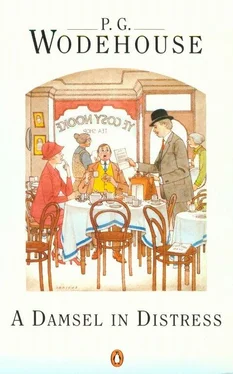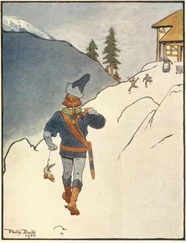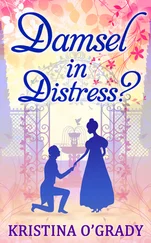“It’s those corduroy trousers,” murmured George in extenuation.
“I have unfortunately lost them.”
“You can always get another pair.”
“Eh?”
“I say you can always get another pair of corduroy trousers.”
“I have not lost my trousers. I have lost the young lady’s name and address.”
“Oh!”
“I promised to send her some roses. She will be expecting them.”
“That’s odd. I was just reading a letter from her when you came in. That must be what she’s referring to when she says, ‘If you see dadda, the old dear, tell him not to forget my roses.’ I read it three times and couldn’t make any sense out of it. Are you Dadda?”
The earl smirked. “She did address me in the course of our conversation as dadda.”
“Then the message is for you.”
“A very quaint and charming girl. What is her name? And where can I find her?”
“Her name’s Billie Dore.”
“Billie?”
“Billie.”
“Billie!” said Lord Marshmoreton softly. “I had better write it down. And her address?”
“I don’t know her private address. But you could always reach her at the Regal Theatre.”
“Ah! She is on the stage?”
“Yes. She’s in my piece, ‘Follow the Girl’.”
“Indeed! Are you a playwright, Mr. Bevan?”
“Good Lord, no!” said George, shocked. “I’m a composer.”
“Very interesting. And you met Miss Dore through her being in this play of yours?”
“Oh, no. I knew her before she went on the stage. She was a stenographer in a music-publisher’s office when we first met.”
“Good gracious! Was she really a stenographer?”
“Yes. Why?”
“Oh—ah—nothing, nothing. Something just happened to come to my mind.”
What happened to come into Lord Marshmoreton’s mind was a fleeting vision of Billie installed in Miss Alice Faraday’s place as his secretary. With such a helper it would be a pleasure to work on that infernal Family History which was now such a bitter toil. But the day-dream passed. He knew perfectly well that he had not the courage to dismiss Alice. In the hands of that calm-eyed girl he was as putty. She exercised over him the hypnotic spell a lion-tamer exercises over his little playmates.
“We have been pals for years,” said George “Billie is one of the best fellows in the world.”
“A charming girl.”
“She would give her last nickel to anyone that asked for it.”
“Delightful!”
“And as straight as a string. No one ever said a word against Billie.”
“No?”
“She may go out to lunch and supper and all that kind of thing, but there’s nothing to that.”
“Nothing!” agreed the earl warmly. “Girls must eat!”
“They do. You ought to see them.”
“A little harmless relaxation after the fatigue of the day!”
“Exactly. Nothing more.”
Lord Marshmoreton felt more drawn than ever to this sensible young man—sensible, at least, on all points but one. It was a pity they could not see eye to eye on what was and what was not suitable in the matter of the love-affairs of the aristocracy.
“So you are a composer, Mr. Bevan?” he said affably.
“Yes.”
Lord Marshmoreton gave a little sigh. “It’s a long time since I went to see a musical performance. More than twenty years. When I was up at Oxford, and for some years afterwards, I was a great theatre-goer. Never used to miss a first night at the Gaiety. Those were the days of Nellie Farren and Kate Vaughan. Florence St. John, too. How excellent she was in Faust Up To Date! But we missed Nellie Farren. Meyer Lutz was the Gaiety composer then. But a good deal of water has flowed under the bridge since those days. I don’t suppose you have ever heard of Meyer Lutz?”
“I don’t think I have.”
“Johnnie Toole was playing a piece called Partners. Not a good play. And the Yeoman of the Guard had just been produced at the Savoy. That makes it seem a long time ago, doesn’t it? Well, I mustn’t take up all your time. Good-bye, Mr. Bevan. I am glad to have had the opportunity of this little talk. The Regal Theatre, I think you said, is where your piece is playing? I shall probably be going to London shortly. I hope to see it.” Lord Marshmoreton rose. “As regards the other matter, there is no hope of inducing you to see the matter in the right light?”
“We seem to disagree as to which is the right light.”
“Then there is nothing more to be said. I will be perfectly frank with you, Mr. Bevan. I like you …”
“The feeling is quite mutual.”
“But I don’t want you as a son-in-law. And, dammit,” exploded Lord Marshmoreton, “I won’t have you as a son-in-law! Good God! do you think that you can harry and assault my son Percy in the heart of Piccadilly and generally make yourself a damned nuisance and then settle down here without an invitation at my very gates and expect to be welcomed into the bosom of the family? If I were a young man …”
“I thought we had agreed that you were a young man.”
“Don’t interrupt me!”
“I only said …”
“I heard what you said. Flattery!”
“Nothing of the kind. Truth.”
Lord Marshmoreton melted. He smiled. “Young idiot!”
“We agree there all right.”
Lord Marshmoreton hesitated. Then with a rush he unbosomed himself, and made his own position on the matter clear.
“I know what you’ll be saying to yourself the moment my back is turned. You’ll be calling me a stage heavy father and an old snob and a number of other things. Don’t interrupt me, dammit! You will, I tell you! And you’ll be wrong. I don’t think the Marshmoretons are fenced off from the rest of the world by some sort of divinity. My sister does. Percy does. But Percy’s an ass! If ever you find yourself thinking differently from my son Percy, on any subject, congratulate yourself. You’ll be right.”
“But …”
“I know what you’re going to say. Let me finish. If I were the only person concerned, I wouldn’t stand in Maud’s way, whoever she wanted to marry, provided he was a good fellow and likely to make her happy. But I’m not. There’s my sister Caroline. There’s a whole crowd of silly, cackling fools—my sisters—my sons-in-law—all the whole pack of them! If I didn’t oppose Maud in this damned infatuation she’s got for you—if I stood by and let her marry you—what do you think would happen to me?—I’d never have a moment’s peace! The whole gabbling pack of them would be at me, saying I was to blame. There would be arguments, discussions, family councils! I hate arguments! I loathe discussions! Family councils make me sick! I’m a peaceable man, and I like a quiet life! And, damme, I’m going to have it. So there’s the thing for you in letters of one syllable. I don’t object to you personally, but I’m not going to have you bothering me like this. I’ll admit freely that, since I have made your acquaintance, I have altered the unfavourable opinion I had formed of you from-from hearsay…”
“Exactly the same with me,” said George. “You ought never to believe what people tell you. Everyone told me your middle name was Nero, and that…”
“Don’t interrupt me!”
“I wasn’t. I was just pointing out …”
“Be quiet! I say I have changed my opinion of you to a great extent. I mention this unofficially, as a matter that has no bearing on the main issue; for, as regards any idea you may have of inducing me to agree to your marrying my daughter, let me tell you that I am unalterably opposed to any such thing!”
“Don’t say that.”
“What the devil do you mean—don’t say that! I do say that! It is out of the question. Do you understand? Very well, then. Good morning.”
Читать дальше







